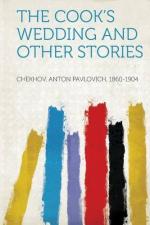After making Pashka sit down, the assistant went out and came back a little later with a bundle of clothes under her arm.
“These are for you,” she said, “put them on.”
Pashka undressed and, not without satisfaction began attiring himself in his new array. When he had put on the shirt, the drawers, and the little grey dressing-gown, he looked at himself complacently, and thought that it would not be bad to walk through the village in that costume. His imagination pictured his mother’s sending him to the kitchen garden by the river to gather cabbage leaves for the little pig; he saw himself walking along, while the boys and girls surrounded him and looked with envy at his little dressing-gown.
A nurse came into the ward, bringing two tin bowls, two spoons, and two pieces of bread. One bowl she set before the old man, the other before Pashka.
“Eat!” she said.
Looking into his bowl, Pashka saw some rich cabbage soup, and in the soup a piece of meat, and thought again that it was very nice at the doctor’s, and that the doctor was not nearly so cross as he had seemed at first. He spent a long time swallowing the soup, licking the spoon after each mouthful, then when there was nothing left in the bowl but the meat he stole a look at the old man, and felt envious that he was still eating the soup. With a sigh Pashka attacked the meat, trying to make it last as long as possible, but his efforts were fruitless; the meat, too, quickly vanished. There was nothing left but the piece of bread. Plain bread without anything on it was not appetising, but there was no help for it. Pashka thought a little, and ate the bread. At that moment the nurse came in with another bowl. This time there was roast meat with potatoes in the bowl.
“And where is the bread?” asked the nurse.
Instead of answering, Pashka puffed out his cheeks, and blew out the air.
“Why did you gobble it all up?” said the nurse reproachfully. “What are you going to eat your meat with?”
She went and fetched another piece of bread. Pashka had never eaten roast meat in his life, and trying it now found it very nice. It vanished quickly, and then he had a piece of bread left bigger than the first. When the old man had finished his dinner, he put away the remains of his bread in a little table. Pashka meant to do the same, but on second thoughts ate his piece.
When he had finished he went for a walk. In the next ward, besides the two he had seen from the door, there were four other people. Of these only one drew his attention. This was a tall, extremely emaciated peasant with a morose-looking, hairy face. He was sitting on the bed, nodding his head and swinging his right arm all the time like a pendulum. Pashka could not take his eyes off him for a long time. At first the man’s regular pendulum-like movements seemed to him curious, and he thought they were done for the general amusement, but when he looked into the man’s face he felt frightened, and realised that he was terribly ill. Going into a third ward he saw two peasants with dark red faces as though they were smeared with clay. They were sitting motionless on their beds, and with their strange faces, in which it was hard to distinguish their features, they looked like heathen idols.




